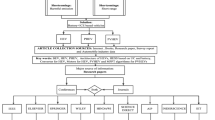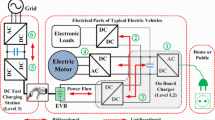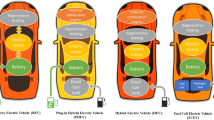Abstract
The energy management strategy (EMS) can efficiently split the power among different sources for a fuel cell electric vehicle (FCEV). This paper puts forward how to cooperate with a proton exchange membrane fuel cell as the primary energy source, and a ultracapacitor as the auxiliary energy storage. Firstly, the test bench of fuel cell is built and the characteristic of fuel cell is tested. A model of vehicle is built in AMESim software based on the real parameters of vehicle especially the characteristic of fuel cell. Secondly, the traditional power following strategy is introduced and an optimal energy management strategy is proposed. The demand power is decomposed by quadratic utility function (QUF) and Karush-Kuhn-Tucker (KKT) condition. In order to balance the vehicle economy and durability of fuel cell, the multi-objective artificial bee colony algorithm (MOABC) and pareto solution set are used to solve the optimal balance coefficient in the algorithm. The simulation results show that compared with the traditional strategy under one WLTP driving cycle, the novel strategy can reduce the fuel cell degradation by 25.08 %, and the equivalent hydrogen consumption can be also reduced.
Similar content being viewed by others
References
Bin Wan Ramli, W. R., Pesyridis, A., Gohil, D. and Alshammari, F. (2020). Organic rankine cycle waste heat recovery for passenger hybrid electric vehicles. Energies 13, 17, 4532.
Bizon, N. and Thounthong, P. (2018). Fuel economy using the global optimization of the fuel cell hybrid power systems. Energy Conversion and Management, 173, 665–678.
Borup, R. L., Kusoglu, A., Neyerlin, K. C., Mukundan, R., Ahluwalia, R. K., Cullen, D. A., More, K. L., Weber, A. Z. and Myers, D. J. (2020). Recent developments in catalyst-related PEM fuel cell durability. Current Opinion in Electrochemistry, 21, 192–200.
Chen, C., Wang, J., Heo, Y. and Kishore, S. (2013). MPC-based appliance scheduling for residential building energy management controller. IEEE Trans. Smart Grid 4, 3, 1401–1410.
Chen, Z., Xiong, R., Wang, K. and Jiao, B. (2015). Optimal energy management strategy of a plug-in hybrid electric vehicle based on a particle swarm optimization algorithm. Energies 8, 5, 3661–3678.
Erdinc, O. and Uzunoglu, M. (2010). Recent trends in PEM fuel cell-powered hybrid systems: Investigation of application areas, design architectures and energy management approaches. Renewable and Sustainable Energy Reviews 14, 9, 2874–2884.
Fernández, R. Á., Caraballo, S. C., Cilleruelo, F. B. and Lozano, J. A. (2018). Fuel optimization strategy for hydrogen fuel cell range extender vehicles applying genetic algorithms. Renewable and Sustainable Energy Reviews, 81, 655–668.
Geng, C., Jin, X. and Zhang, X. (2019). Simulation research on a novel control strategy for fuel cell extended-range vehicles. Int. J. Hydrogen Energy 44, 1, 408–120.
Gharibeh, H. F., Yazdankhah, A. S. and Azizian, M. R. (2020). Energy management of fuel cell electric vehicles based on working condition identification of energy storage systems, vehicle driving performance, and dynamic power factor. J. Energy Storage, 31, 101760.
Hu, X., Han, J., Tang, X. and Lin, X. (2021). Powertrain design and control in electrified vehicles: A critical review. IEEE Trans. Transportation Electrification 7, 3, 1990–2009.
Hwang, J. J., Hu, J. S. and Lin, C. H. (2015). A novel range-extended strategy for fuel cell/battery electric vehicles. The Scientific World J., 2015, 363094.
Karaoglan, M. U., Kuralay, N. S. and Colpan, C. O. (2019). Investigation of the effects of battery types and power management algorithms on drive cycle simulation for a range-extended electric vehicle powertrain. Int. J. Green Energy 16, 1, 1–11.
Li, D., Xu, B., Tian, J. and Ma, Z. (2020). Energy management strategy for fuel cell and battery hybrid vehicle based on fuzzy logic. Processes 8, 8, 882.
Lian, R., Peng, J., Wu, Y., Tan, H. and Zhang, H. (2020). Rule-interposing deep reinforcement learning based energy management strategy for power-split hybrid electric vehicle. Energy, 197, 117297.
Liu, Y, Liu, J., Zhang, Y, Wu, Y., Chen, Z. and Ye, M. (2020). Rule learning based energy management strategy of fuel cell hybrid vehicles considering multi-objective optimization. Energy, 207, 118212.
Ma, L., Liu, N., Zhang, J., Tushar, W. and Yuen, C. (2016). Energy management for joint operation of CHP and PV prosumers inside a grid-connected microgrid: A game theoretic approach. IEEE Trans. Industrial Informatics 12, 5, 1930–1942.
Mbuwir, B. V., Vanmunster, L., Thoelen, K. and Deconinck, G. (2021). A hybrid policy gradient and rule-based control framework for electric vehicle charging. Energy and AI, 4, 100059.
Mebarki, N., Rekioua, T., Mokrani, Z. and Rekioua D. (2015). Supervisor control for stand-alone photovoltaic/hydrogen/battery bank system to supply energy to an electric vehicle. Int. J. Hydrogen Energy 40, 39, 13777–13788.
Ouddah, N., Adouane, L. and Abdrakhmanov, R. (2018). From offline to adaptive online energy management strategy of hybrid vehicle using pontryagin’s minimum principle. Int. J. Automotive Technology 19, 3, 571–584.
Qi, X., Luo, Y., Wu, G., Boriboonsomsin, K. and Barth, M. (2019). Deep reinforcement learning enabled self-learning control for energy efficient driving. Transportation Research Part C: Emerging Technologies, 99, 67–81.
Rajabzadeh, M., Bathaee, S. M. T. and Golkar, M. A. (2016). Dynamic modeling and nonlinear control of fuel cell vehicles with different hybrid power sources. Int. J. Hydrogen Energy 41, 4, 3185–3198.
Song, K., Chen, H., Wen, P., Zhang, T., Zhang, B. and Zhang, T. (2018). A comprehensive evaluation framework to evaluate energy management strategies of fuel cell electric vehicles. Electrochimica Acta, 292, 960–973.
Sorlei, I. S., Bizon, N., Thounthong, P., Varlam, M., Carcadea, E., Culcer, M., Iliescu, M. and Raceanu, M. (2021). Fuel cell electric vehicles—A brief review of current topologies and energy management strategies. Energies 14, 1, 252.
Sulaiman, N., Hannan, M. A., Mohamed, A., Ker, P. J., Majlan, E. H. and Daud, W. W. (2018). Optimization of energy management system for fuel-cell hybrid electric vehicles: Issues and recommendations. Applied Energy, 228, 2061–2079.
Sun, Z., Wang, Y., Chen, Z. and Li, X. (2020). Min-max game based energy management strategy for fuel cell/supercapacitor hybrid electric vehicles. Applied Energy, 267, 115086.
Wang, Y., Sun, Z. and Chen, Z. (2019). Rule-based energy management strategy of a lithium-ion battery, supercapacitor and PEM fuel cell system. Energy Procedia, 158, 2555–2560.
Xie, R., Ma, R., Pu, S., Xu, L., Zhao, D. and Huangfu, Y. (2020). Prognostic for fuel cell based on particle filter and recurrent neural network fusion structure. Energy and AI, 2, 100017.
Yu, Y. X. and Ahn, K. K. (2019). Optimization of energy regeneration of hybrid hydraulic excavator boom system. Energy Conversion and Management, 183, 26–34.
Zhang, H., Li, X., Liu, X. and Yan, J. (2019). Enhancing fuel cell durability for fuel cell plug-in hybrid electric vehicles through strategic power management. Applied Energy, 241, 483–190.
Zhang, T., Wang, P., Chen, H. and Pei, P. (2018). A review of automotive proton exchange membrane fuel cell degradation under start-stop operating condition. Applied Energy, 223, 249–262.
Zheng, C. H., Oh, C. E., Park, Y. I. and Cha, S. W. (2012). Fuel economy evaluation of fuel cell hybrid vehicles based on equivalent fuel consumption. Int. J. Hydrogen Energy 37, 2, 1790–1796.
Zhou, W., Yang, L., Cai, Y. and Ying, T. (2018). Dynamic programming for new energy vehicles based on their work modes Part II: Fuel cell electric vehicles. J. Power Sources, 407, 92–104.
Zhou, Y., Li, H., Ravey, A. and Péra, M. C. (2020). An integrated predictive energy management for light-duty range-extended plug-in fuel cell electric vehicle. J. Power Sources, 451, 227780.
Acknowledgement
This work was supported by the Science and Technology Department of Jiangsu Province (Key Science and Technology Program of Jiangsu Province, BE2018 343-1); Senior Talent Fund through the Jiangsu University (20JDG 069); Jiangsu provincial colleges of Natural Science General Program (21KJB460028); China Postdoctoral Science Foundation (2021M 701477).
Author information
Authors and Affiliations
Corresponding author
Additional information
Publisher’s Note
Springer Nature remains neutral with regard to jurisdictional claims in published maps and institutional affiliations.
Rights and permissions
About this article
Cite this article
Sun, Y., Xia, C., Yin, B. et al. Adaptive Energy Management Strategy of Fuel Cell Electric Vehicle. Int.J Automot. Technol. 23, 1393–1403 (2022). https://doi.org/10.1007/s12239-022-0122-y
Received:
Revised:
Accepted:
Published:
Issue Date:
DOI: https://doi.org/10.1007/s12239-022-0122-y




